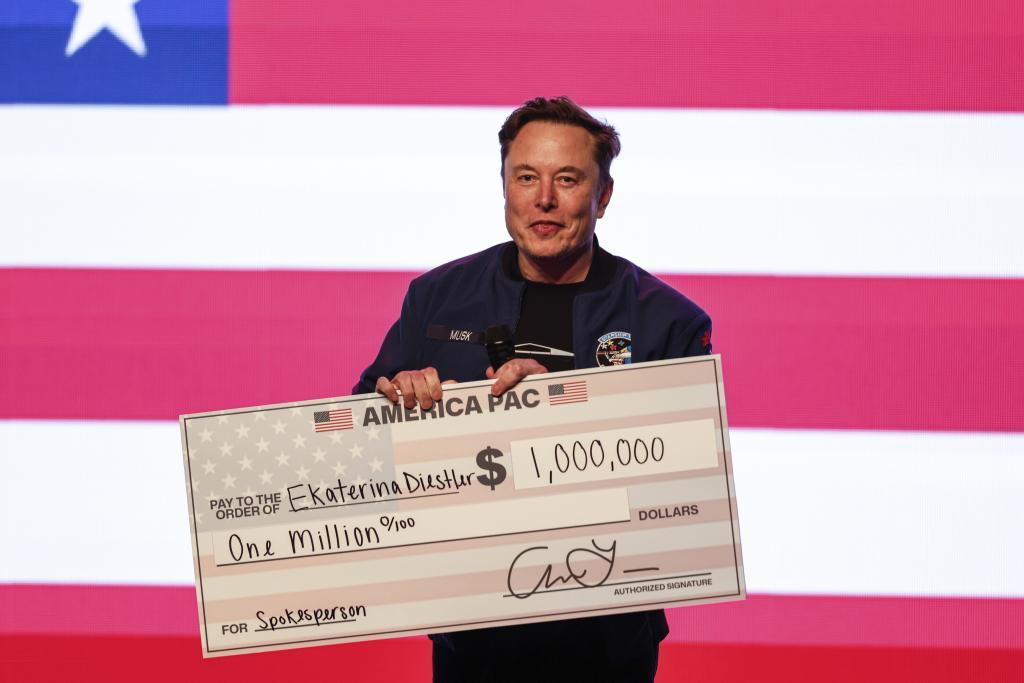Last Saturday, Elon Musk expressed hope that the US and the EU will eventually establish a tariff-free trade zone. The break from President Trump's strategy - whom he helped reach the White House and who recently organized an act of reparation for him - came a day after Tesla's stock value dropped to $716 billion.
It is still more than triple the value of Toyota, the world's leading manufacturer, but 53% less than the peak on Christmas Eve 2024. Compared to January 20th, when Trump took office (and Musk with him), $602.655 billion have vanished, 44% of the total. This represents the largest loss among the Magnificent Seven: Tesla, Amazon, Alphabet, Apple, Nvidia, Meta, and Microsoft.
The South African billionaire has felt the blow in his pocket, with his fortune decreasing by over $126 billion.
Tesla will be minimally affected by tariffs: almost everything it sells in the US is locally manufactured. The same goes for China. However, the new tariffs have been the last straw. In 2024, its global sales declined for the first time in years, with 1.79 million cars sold (-1.2%) and a significant 12% drop in California, considered its sancta sanctorum, where it still held over 50% of the electric car market last year.
The situation has worsened even more this year. According to the company's own accounts, between January and March, it sold 337,000 vehicles, 13 percentage points less than the same period in 2024; and 32 points less compared to the last quarter of 2024, which traditionally is the strongest for the brand. In fact, one would have to go back to the first half of 2022 to find such low results.
"We knew a tough first quarter was coming, but it has been even worse than expected and is a clear example of the damage Musk is causing to Tesla," stated analysts at Wedbush Securities, urging the entrepreneur to "overcome this brand crisis and pull the company out of the dark moment it is going through."
Despite Wedbush Securities believing that the manufacturer will still outperform the Nasdaq, they have reduced their target stock value forecast by 43%, from $550 to $315, due to brand image issues and low demand.
Strong Social Backlash
Because in justifying the decline in early 2025, the company only attributes it to the impact of transitioning from the old Model Y - its best-selling car by far - to the new generation. An adaptation that led to several weeks of work lost at its four factories (two in the US, one in China, and one in Europe).
We will have to wait for the financial results conference on April 22nd, but so far, there is not a single line dedicated to the tremendous social backlash that Musk has provoked. In the US, due to his alignment with Trump's ideologies, manifested in the thousands of layoffs he carried out (jokingly with a chainsaw) during his brief tenure leading the Human Resources department, although he will soon leave the position.
In this regard, Musk has never hesitated to lay off people, as demonstrated at Tesla (announcing 14,000 layoffs last year) or in 2022 when he acquired the social network X, formerly known as Twitter, and in an initial outburst, got rid of half of the staff. But those were different times.
Now, a CNN survey conducted last month revealed that only 35% of Americans had a positive opinion of Musk, while 53% rated him negatively, a figure even higher than the 44% obtained by Vice President J.D. Vance. The animosity is greater among those more interested in purchasing battery-powered vehicles.
This is compounded by the rejection in Europe for aligning with the far-right in the UK, Italy, or Germany, where it has a factory in Berlin.
Attacks on Cars and Dealerships
The result? At best, famous figures publicly parting ways with their Tesla vehicles in embarrassment, and anonymous users either disguising or putting stickers on their cars apologizing and recalling that they purchased them before "Musk went crazy." At worst, the publication of lists of Tesla car owners and vandalism or fires targeting dealerships and Tesla vehicles.
Nothing like those 2016 queues with hundreds of people waiting to reserve the Model 3 when it was announced. It accumulated up to 275,000 orders in a few weeks despite the 18-month waiting period for the vehicle.
The setback in Europe is the best reflection of all these challenges. In January and February, battery-powered vehicle registrations grew by 31.4%, with 330,584 transactions and a historic market share of 16.8%. During the same period, Tesla declined by 42.6%, with only 26,619 units sold across the EU, UK, Norway, Switzerland, and Iceland.
Part of the 2025 setback is also explained by the increasingly fierce competition, especially from Chinese brands and in China. Particularly, BYD. Months ago, in an interview with this newspaper, BYD's Europe responsible vice president, Stella Li, stated that they were "not enemies of Tesla" because both were fighting against a common rival: "the combustion car."
However, BYD is focused on its goals, and between January and March this year, it sold over a million vehicles, with 416,388 being pure electric. This represents almost a 40% growth and a clear lead towards global leadership in this technology, narrowly missed by 20,000 units in 2024. Even though the majority of its sales are domestic, BYD expects to double exports to 800,000 units this year, but they will still not exceed 15% of their global sales.
Meanwhile, experts like those at Deutsche Bank estimate that Tesla's volumes could drop between 5% and 9% this year.
